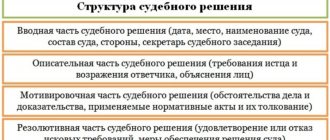The Supreme Court explained how to implement decisions
The decision cannot be executed
The marriage between Marfa and Stepan Cheborev* broke up, the Petrovsky District Court of the Stavropol Territory determined the composition of the jointly acquired property and divided it. Marfa, among other things, was recognized as having ownership of a car worth 208,500 rubles. Based on the court decision, Marfa received a writ of execution, and enforcement proceedings were initiated. During the enforcement actions, it became known that Stepan had no registered vehicles; the disputed car was re-registered to a new owner eight months ago. Therefore, the bailiff issued a ruling to end the enforcement proceedings and returned the writ of execution to the claimant due to the impossibility of its execution.
CASE No. 19-КГ19-9
PLAINTIFF: Marfa Cheboreva*
DEFENDANT: Stepan Cheborev*
ESSENCE OF THE DISPUTE: On changing the method and procedure for executing a court decision
DECISION: The appeal ruling is cancelled, the ruling of the court of first instance is upheld
Marfa filed an application to change the method and procedure for executing the court decision - she asked to recover the cost of the car in the amount of 208,500 rubles from Stepan in her favor. The Petrovsky District Court of the Stavropol Territory found that, according to information from the MREO traffic police department of Svetlograd, the car had indeed been re-registered to the new owner, and satisfied the claim. In collecting 208,500 rubles from Stepan, the court relied on the results of a forensic appraisal carried out as part of the division of the spouses’ property.
The Stavropol Regional Court overturned the decision and rejected Marfa's claim. The appeal found no evidence in the case materials that the car was actually in the possession and use of the new owner. She emphasized: during the appraisal examination, the specified car was not inspected, its value was determined by comparison with similar objects, while in fact Stepan sold the car for 80,000 rubles.
The Supreme Court noted: the debtor did not provide and the courts did not refer to evidence of the possibility of enforcing the decision. On the contrary, Stepan confirmed the fact of the sale of the car. Its cost is 208,500 rubles. established at the time of division of property by a court decision that entered into legal force. The value of the property to be divided is determined during the consideration of the case, which the appeal did not take into account (clause 15 of the resolution of the Plenum of the Supreme Court of November 5, 1998 No. 15). According to the Supreme Court, under such circumstances the regional court could not overturn the ruling of the court of first instance (Article 330 of the Civil Code). Therefore, the Supreme Court canceled the appeal ruling and upheld the ruling of the Petrovsky District Court (No. 19-КГ19-9).
The claimant can be protected
Pravo.ru experts criticized the actions of the appeal. “The position of the court of second instance raises many questions. It is not clear what he was guided by, citing the lack of evidence of the disposal of the car from the property of his ex-husband. If the appeal did not agree with the assessment of the value of the car, it could proceed to the consideration of the case according to the rules of procedure in the court of first instance and order a new examination, but did not do this. That is, the appeal went beyond its powers,” says lawyer, partner of the international rights protection center Globallaw Andrei Saunin. “The Court of Appeal incorrectly assessed a number of circumstances relating to the valuation of property. In addition, the appellate court did not take into account the evidence that the court order was not executed due to the debtor’s lack of a car,” explained a lawyer at BMS Law Firm BMS Law Firm Federal Rating. Vladimir Shalaev.
Such cases are pleasantly surprising and, one might say, strengthen the often not very strong faith in Russian legal proceedings. There is an almost idealistic example of the functioning of the justice system, where moving up the stairs of the courts gives a clear positive result and leads to the triumph of justice
Arthur Velikzhanin, lawyer AB Kazakov and partners Kazakov and partners Federal rating. group Antimonopoly law (including disputes) group Bankruptcy (including disputes) group Natural resources/Energy group Criminal law 22nd place By revenue per lawyer (more than 30 lawyers) 22nd place By number of lawyers 37th place By revenue Profile, - noted advisor AB Kazakov and partners Kazakov and partners Federal rating. Antitrust Law group (including disputes) Bankruptcy group (including disputes) Natural Resources/Energy group Criminal Law group 22nd place By revenue per lawyer (more than 30 lawyers) 22nd place By number of lawyers 37th place By revenue Company profile Vasily Fotinsky. And senior lawyer YB Padva and Epstein Padva and Epstein Federal rating. 29th place In terms of the number of lawyers, Lyudmila Shalyapina said: recently the Supreme Court already reminded that when considering similar applications, the court must establish whether there are circumstances preventing the debtor from executing the writ of execution (No. 44-KG18-25). “By canceling the illegal determination of the appeal, the Supreme Court restored the plaintiff’s guaranteed right to the proper and timely execution of judicial acts that have entered into legal force, if such execution in the original way is impossible or difficult,” says Shalyapina.
* – first and last names have been changed by the editors.
- Alina Mikhailova
- Supreme Court of the Russian Federation
- Civil process
With what property are BUs and ACs liable for their obligations?
In accordance with paragraph 2 of Art. 120 Civil Code of the Russian Federation:
• an autonomous institution is responsible for its obligations with all the property it has under the right of operational management, with the exception of real estate and especially valuable movable property assigned to the autonomous institution by the owner of this property or acquired by the autonomous institution at the expense of funds allocated by such owner;
• a budgetary institution is liable for its obligations with all the property it has under the right of operational management, both assigned to the budgetary institution by the owner of the property, and acquired from funds received from income-generating activities, with the exception of especially valuable movable property assigned to the budgetary institution by the owner this property or acquired by a budgetary institution at the expense of funds allocated by the owner of the property of the budgetary institution, as well as real estate.
Thus, the list of types of property of the management company, which can be foreclosed on, is larger than that of the management company, which is more attractive for counterparties. At the same time, an independent company, unlike a financial management company, risks losing its real estate, without which it will not be able to engage in income-generating activities for some time.
End of enforcement proceedings
The concept of “validity of a court decision on debt collection” also includes the deadline for the completion of proceedings by the bailiff. List of grounds for ending the proceedings in question, provided for in Part 1 of Art. 47 of Law No. 229-FZ is exhaustive:
- fulfillment of the requirement;
- return of the document to the applicant;
- lapse of time;
- redirection of a document (including due to the recognition of the debtor as bankrupt/liquidation of the debtor - a legal entity).
In all cases, the proceedings are considered completed, but this does not indicate that the debt, if it has not been collected (for example, the debtor does not have property that can be foreclosed on), will remain outstanding.
Special procedure for collecting funds from financial accounting?
In accordance with paragraph 20 of Art. 30 of Federal Law No. 83-FZ (as amended on November 29, 2010), foreclosure on funds of financial institutions whose personal accounts are opened with the Federal Treasury or the financial body of a constituent entity of the Russian Federation (municipal entity) is carried out by sending the court or presenting a writ of execution to this financial authority. The writ of execution (with the exception of a court order) is accompanied by a statement from the claimant, which indicates the details of the bank account of the claimant, to which the funds to be collected should be transferred. The application is signed by the claimant or his representative, accompanied by a power of attorney (or a notarized copy thereof) certifying the authority of the representative.
The financial authority that received the writ of execution, no later than five working days after its receipt, sends the BU-debtor a notice of the receipt of the writ of execution and the date of its acceptance for execution, attaching the claimant’s application.
The accounting debtor, within 30 working days from the date of receipt of notification of the receipt of the writ of execution, submits to the body responsible for opening and maintaining his personal accounts a payment document for the transfer of funds for full or partial execution of the writ of execution within the total balance of funds recorded on the personal account debtor.
In this case, the accounting debtor independently determines from which personal account (personal accounts) opened to him, funds should be written off to fulfill the requirements contained in the writ of execution.
In the absence or insufficiency of funds for the execution of the presented executive documents, the debtor accountant is obliged to provide to the body that opens and maintains his personal accounts a payment document for the transfer of funds for full or partial execution of the executive document no later than the next business day after the day of receipt of funds for a certain their personal account.
If payments for the execution of a writ of execution are of a periodic nature, the BU debtor, simultaneously with the payment document, submits to the body that opens and maintains his personal accounts information about the date of monthly payment under this writ of execution.
If the accounting debtor violates the specified requirements, as well as the period for monthly payment under the writ of execution, the financial authority, until the violation is eliminated, suspends operations to spend funds on all personal accounts of the debtor, including personal accounts of its structural (separate) divisions.
The body of the Federal Treasury, the financial body of a constituent entity of the Russian Federation (municipal entity) keeps records and stores executive and other documents related to their execution in the prescribed manner.
If it is impossible to collect funds from the debtor due to the absence of funds in his personal accounts for more than three months, the execution of the writ of execution is carried out by foreclosure on the debtor’s property in accordance with the Federal Law “On Enforcement Proceedings”.
Thus, this procedure for foreclosure on accounting funds differs from the procedure described in Chapter. 24.1 of the Budget Code of the Russian Federation in relation to foreclosure on funds of the accounting system, which was in force before amendments were made to the Budget Code of the Russian Federation by Federal Law No. 83-FZ. The peculiarity is that the main manager (manager) of funds from the corresponding budget does not allocate limits on budgetary obligations (budget allocations) and (or) volumes of financing expenses for the debtor, that is, the owner of the property of the debtor is not liable for the obligations of the latter.
Statute of limitations for compulsory execution of a judicial act
These deadlines are important for understanding the time frame within which a court decision can be submitted for enforcement. They are established by art. 21 of the Law on Enforcement Proceedings:
- 3 years from the date of entry into force of the court decision - according to the writ of execution, which was issued on the basis of such a court decision;
- 3 years from the date of issue – by court orders;
- the validity period of the awarded periodic payments plus an additional 3 years for court decisions to collect such payments;
- 2 years from the date of entry into force of the decision - for court decisions on administrative offenses.
Deadlines may be interrupted or suspended. There are quite a lot of reasons for this - Art. 22, Art. 39-40 of the Law. Completed and terminated enforcement proceedings can be resumed by bailiffs. Therefore, the process of enforcement of a court decision can last a very long time, as long as the debtor is alive or there is an organization obligated to fulfill the requirements established by the court.
General rules on deadlines for execution of court decisions
Specific deadlines for the execution of certain judicial acts are provided for by the norms of the relevant procedural code. The deadlines for the compulsory execution of court decisions are established by executive legislation, in particular the Law on Enforcement Proceedings. In this regard, it is customary to distinguish:
- The period for execution of a court decision is the period established by procedural law during which the decision must be executed voluntarily. This period begins:
- immediately – for judicial acts that immediately come into force;
- after the expiration of the period established by the procedural law - for judicial acts that come into force after the expiration of the appeal period;
- upon expiration of the period established by the court decision itself or a court decision to defer execution.
- The period for compulsory execution of a court decision (the statute of limitations for applying for enforcement of a court decision) is the period established by executive legislation. Depending on the type of decision, this period begins to run, either at the time it enters into force or at the time the court decision is issued.



